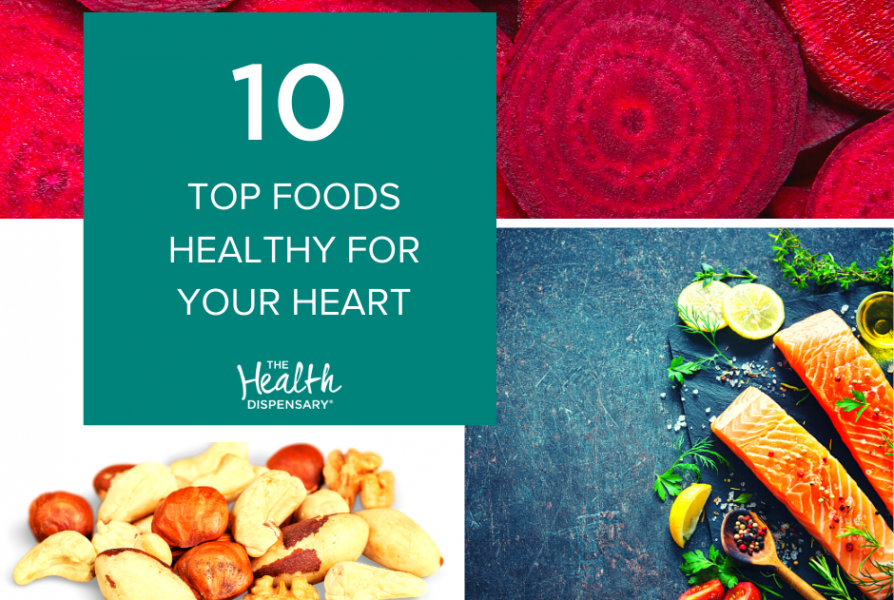There’s no magic food that can keep your heart healthy but here are some of our favourites that we think help to do what the Heart is good at – Love and nurture!
1. Salmon
Salmon is rich in omega-3 fatty acids which can help improve your “good” HDL cholesterol. Omega-3 fatty acids are healthy fats that can help reduce blood pressure and keep your arteries healthy. HDL cholesterol or high-density lipoproteins carries cholesterol from other parts of your body back to your liver, which then removes cholesterol from your body. A great tip is to eat fatty fish like salmon at least twice a week or other fish that contain omega-3s, like mackerel, tuna or sardines.
2. Avocado
Avocados have certainly become a popular superfood these days. At first they may be an acquired taste, but persevere and they will soon become one of your favourites. With their waxy, creamy taste they not only help to fill you up but also can help lower your cholesterol. Avocados are high in healthy monounsaturated fat helping to lower LDL cholesterol. LDL or low-density lipoproteins is sometimes called “bad” cholesterol because it leads to a buildup of cholesterol in your arteries meaning blood doesn’t flow as well around the body, which in turn increases blood pressure.
Avocados contain fibre, antioxidants and phytosterols or plant sterols, which have also been shown to lower cholesterol. They are quite high in calories but make a great breakfast smashed on toast as they help satiate the appetite (keep you fuller for longer).
3. Garlic
Garlic has been used to boost immunity and promote heart health for years, possibly helping with cholesterol regulation. Garlic was an important medicine to the ancient Egyptians and may have been used at the earliest Olympics in Greece to increase stamina. Garlic contains vitamins C and B6, manganese and selenium and a chemical called allicin which has many therapeutic properties including killing bacteria. Eating garlic may help lower blood pressure although there’s not a lot of research to back it up, however it makes sense that tastier food means less salt.
4. Beetroot
Beetroot is rich in nitrates which dilate or open up the arteries causing a decrease in blood pressure and is now also thought to have a role in the nervous system connecting to the heart. Beetroot is a good source of vitamin C, iron, folate, magnesium and betacyanin, an antioxidant important for a healthy heart. It’s a great source of dietary fibre and whilst in the UK we’ve been used to the purple variety, you can now also get lovely shades of orange and yellow for variety. It’s worth remembering the purple beetroot can make your urine red -and can darken the stools – so not to panic after toilet visits ! You can also use the leaves for salads and juicing. They have been used for centuries, and it’s interesting that the Romans actually only ate the leaves.
5. Oats
Oats are high in beta-glucans or soluble fibers that lowers cholesterol levels by forming a sticky layer in the small intestine which blocks cholesterol from entering the bloodstream. Oats are also though to control blood sugar levels as the dietary fibre slows the transit of food through the body and helps to prevent spikes of blood sugar which can lead to more hunger and the desire for more sugar. They can be a great food option for those with diabetes too.
Porridge is a great breakfast option and adding fruit to porridge naturally sweetens it and boosts the fibre content even more. Oats can be used in many more ways, adding to shakes and juices, made into snacks for a variety of savoury and sweet options. They also go a long way so are a great frugal food.
6. Apples
Apples contain pectin, another type of soluble fibre that helps to clear bad cholesterol out of your body. Pectin is higher in the skin so important to eat this too, after washing the fruit, unless you have a flare up of diverticulitis where the skins can make it worse. The whole fruit is better than juicing as the pulp is needed to get all the benefit of this superfood. Apples are also high in polyphenols which are powerful antioxidants helping to reduce inflammation.
7. Beans
Beans are high in protein, which makes them a great replacement for animal protein sources, such as meat increasing heart-healthy options. if you’re a meat-lover or on a budget then beans can be used to eke out the meat content and still be as satisfying They’re also great in soups and salads, dips and as a main ingredient of the infamous and popular beans on toast
8. Nuts
Nuts are high in heart-healthy monounsaturated fat, fibre, vitamins and plant sterols, which help to block dietary cholesterol from entering your bloodstream. Portion control is important, as like avocados they are high in calories. Delicious healthy nuts include almonds, walnuts, pistachios and pecans which have been shown to lower both total cholesterol and “bad” LDL cholesterol. Peanuts are not actually a nut an therefore it was thought they were not as healthy. However they contain lots of protein, are perhaps kinder to the environment, are cheaper, but here’s the rub- not best eaten processed or salted. a lot of the goodness is in the papery skin, so eat the natural version – and if in the shell (we used to call monkey nuts) cracking them open probably reduces the amount you can eat !
………and just to prove life doesn’t need to be too boring! we also have
9. Dark Chocolate
Dark chocolate and cocoa powder contain powerful antioxidant compounds called flavonoids. Flavonoids help to lower cholesterol, milk chocolate has lower levels, and white chocolate even lower. So, small portions of dark chocolate with a high cocoa content is the best option, or try some cocoa powder in your smoothie or on yoghurt?
10. Red Wine
In moderation of course! Red wine contains antioxidants called polyphenols which help keep your blood vessels healthy. In case we forget moderation means one to two units of alcohol per day – it’s better to have at least a day wine free! and not to drink your units all in one go (binge drinking). Drinking red wine may help to increase “good” HDL cholesterol and decrease “bad” LDL cholesterol.
If you’d like help with a Healthy Lifestyle, and are curious to find out your Blood Cholesterol or Blood Pressure readings please give us a Call on 01639 502860 to speak to our friendly team.


